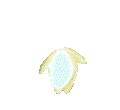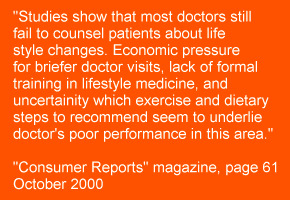|
 Simple
"Food Rules" for Great Health and Long Life
Simple
"Food Rules" for Great Health and Long Life
Copyright 1992-2014, Digital Recordings, All Rights Reserved Last updated February 01, 2002
PDF version (14 kB)
Food delivers matter plus
energy and negative
entropy (measure of disorder and organization) to
growing organisms and energy and negative entropy
to adult organisms (matter is used only as a carrier
of energy and negative entropy in this case).
Let's consider our food supply from this point of view,
which is based on the Information Theory.
Once upon a time, all food was organically grown.
Financial pressures on agriculture, the development
of "modern science" and the application of a narrow-minded
approach by some "scientists", led to the
following changes:
The "Food Rules" below are based on the
conclusions from my paper
"Life on Earth - flow
of Energy and Entropy". Food is
a vehicle to deliver Energy and Negative Entropy
(organization) to living organisms. Any kind of food
processing increases food's Entropy, making it
less valuable for the sustaining of Life, thus
promoting disease and the aging process. Below
are some specific rules based on this model:
Eat food which is local and as fresh as possible.
Eat foods which were familiar to your ancestors,
rather than exotic foods not known in your region.
Test these foods for your tolerance first if you wish
to eat them. Test them item by item and then in
combinations.
Eat food which is as close to the Sun as possible (i.e. low on the food
chain). This usually results in much reduced levels of contaminants and
fewer "broken" molecules which promote the aging process. Also, more
food can be produced this way, therefore it is an environmentally-friendly
way of eating.
Plant sources of organic substances are better than animal sources,
since they are lower on the food chain. Again, one will find fewer
contaminants in plants and fewer "broken" molecules which promote the
aging process.
Avoid the processing of foods. The most valuable benefit of food is when
it is raw. If processing is required, (due to viruses, bacteria, parasites
or to improve digestion) - short cooking in boiling water, (at 100 degree
Celsius) is the safest with the least damage. Frying, BBQ, Micro-waving,
baking, etc., all damage the structures of foods due to high temperatures,
making them less valuable. It also produces "broken" molecules which are
then incorporated into one's body, speeding up the aging process. If one's
body cannot synthesize certain molecules, it most likely cannot check them
atom-by-atom for lack of structural damage. Damaged structures will be
therefore incorporated into the body, speeding-up the aging process. Simple
experiments on lab animals could easily prove this.
These ways of handling food could be called "Low
Entropy Cooking" or "Low
Entropy Diet". The benefits of this kind of food preparation are;
money-saving, since food contains more valuable ingredients; time saving,
since it takes much less time to prepare food this way; health improvement
and maintenance, since this food will deliver all the required components
for the body and its immune system; extension of the life span, since
this kind of food will slow the aging process (by about 20% to 40% in my
estimation).
Eat moderate amounts of food and divide it into 5 small meals a day.
In this way, your body will digest and absorb food more thoroughly.
Do not mix too many foods at once. Certain foods go well together and
promote better digestion.
Avoid foods which use cheap, non-organic
ingredients and are overprocessed. These foods
will have a lot of contaminants and many
molecules in these foods will be damaged due to
heavy processing. This will result in health
problems and promote aging (as much as 20% to
40% in my estimation).
Avoid foods containing preservatives or those
that have been irradiated with X-rays, gamma
and other rays. If bacteria are not eating the food,
it is probably not good for you.
Your diet should include: plant protein (whole
grains and beans are the best source), various
plant oils (whole grains, seeds, nuts and beans
are the best source), various nuts (fresh almonds
and hazel nuts are best), various types of fish
which are from the ocean and are low on the food
chain, vitamins and minerals, eggs, yogourt, milk and
white cheese (goat's milk is the best, if you can
tolerate this).
A good diet should include 8 to 16 glasses of
pure, body-temperature, well pH-balanced water per day.
Contaminants such as chlorine, lead, pesticides,
herbicides etc., should be removed with a good-quality
water filter from reputable companies
such as Doulton or
Aquasana.
The best guide to health and a healthy diet is a
book by the Canadian author Dr. Udo
Erasmus, Ph.D., "Fats that Heal, Fats that Kill". I highly
recommend you include this book in your library.
Organic foods, supplements and books can be
found in your local organic food stores. Always
check ingredients and the source of your food as
well as what kind of processing it underwent. Check also
this web site for additional information.
Non-organic, genetically-altered, irradiated and
highly processed foods - in particular: all sorts of fast,
processed foods, hamburgers and other red meats
(animals are too high on the food chain), vegetables,
fruits, eggs and seafood produced on non-organic
farms, margarines & shortenings (hydrogenated oils
- very dangerous ! Hydrogenation is a chemical process
which damages the molecular structure of oils and fats,
forming many toxic molecules not found in nature.),
deep-fried foods, ice cream,
homogenized and skim milk, non-organic and non
cold-pressed oils, sweets, chocolates and pastry
which are made from refined sugars, hydrogenated
oils (margarines & shortenings - if
margarine was better
for health than butter, cows would evolve to make margarine)
and non-organic
and highly-processed ingredients, soft drinks which
are not based on natural juices and are highly-
processed, artificial sweeteners, colours etc., all
should be avoided. Avoid soy and soy-derived food products.
They contain food absorption inhibitors, hormone disruptors,
neurotoxins, denatured proteins, solvents and aluminum. For more information look
under "Soy Alert !".
The general rule is to use containers which do not
react with food and do not produce contaminants.
The best containers are made of high-quality glass
and ceramics, which are lead-free. Some plastics
and metals react with food and introduce
contaminants.
For cooking, it is best to use high-quality glass and
ceramic pots which are lead-free or high-quality
stainless steel pots. Other metals like aluminum,
silver, copper, lead, iron, zinc, etc. should be
avoided, since they react with food.
Organic foods are available at organic food
stores such as "Great Ocean" or from organic farmers at
"Farmers' Market" in Halifax, N.S.
A good diet can prevent or cure many disorders
(including cancer, obesity), which are considered
to be "non-curable" by traditional medicine, which
uses an overly simplistic approach to health.
Contact with food is more intimate than sex, since food
becomes a part of us, while our sexual partner does not.
Yet, many people make split-second decisions about what
and where to eat, often endangering their health and life.
This proposed diet also has a very positive effect
on cognition, behaviour, level of happiness and psychological mood
stability. It also affects memory and intelligence since
information processing capability requires
continuous flow of Negative Entropy or
Information.
Remember, "you are what you eat".
Terms of Use | Return Policy | Privacy Policy
No part of the information provided on this www page may be reproduced for any purpose, in any form, without prior written approval.
|
 Take vitamins and supplements right after
meals. Distribute them evenly over 3 meals
during the day. Good brand names for vitamins
and minerals are "QUEST" and "Natural Factors".
Take vitamins and supplements right after
meals. Distribute them evenly over 3 meals
during the day. Good brand names for vitamins
and minerals are "QUEST" and "Natural Factors".